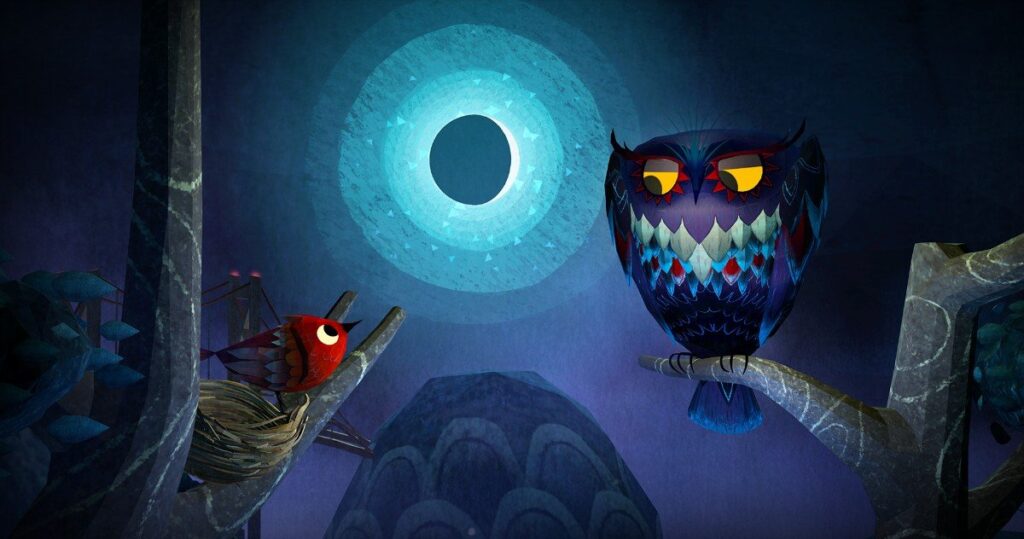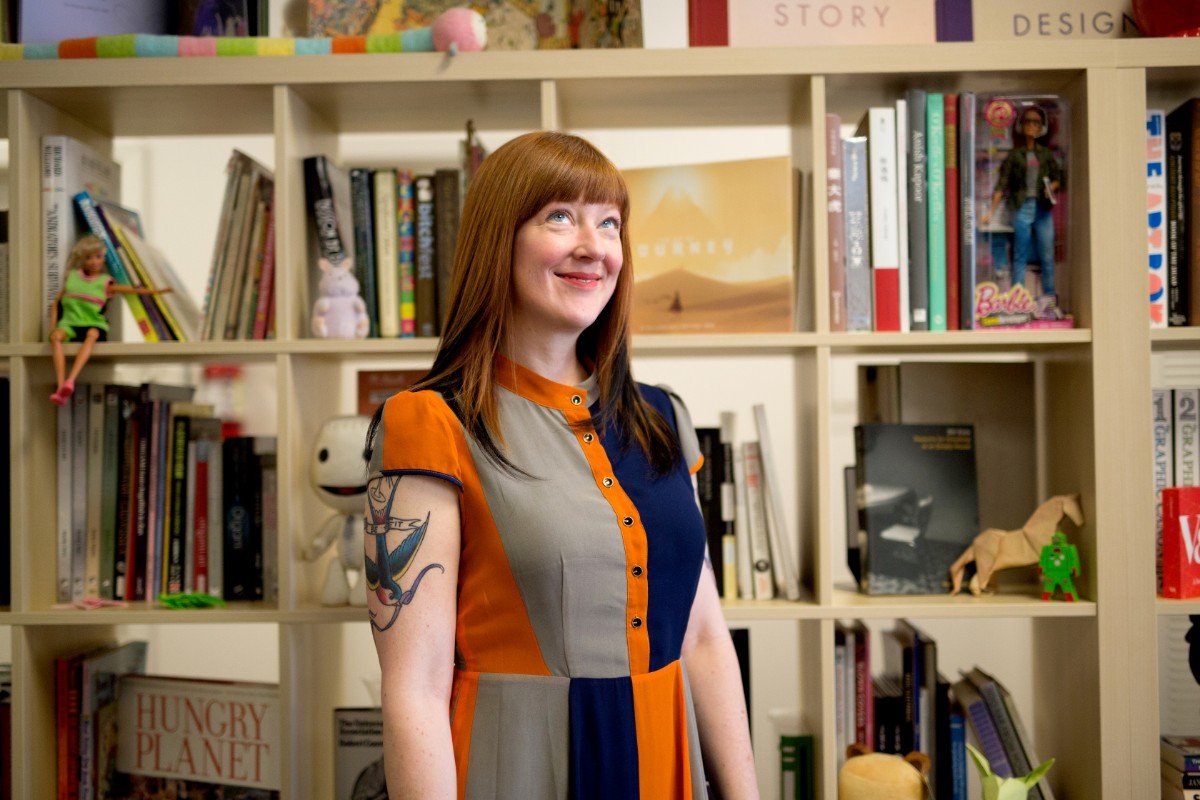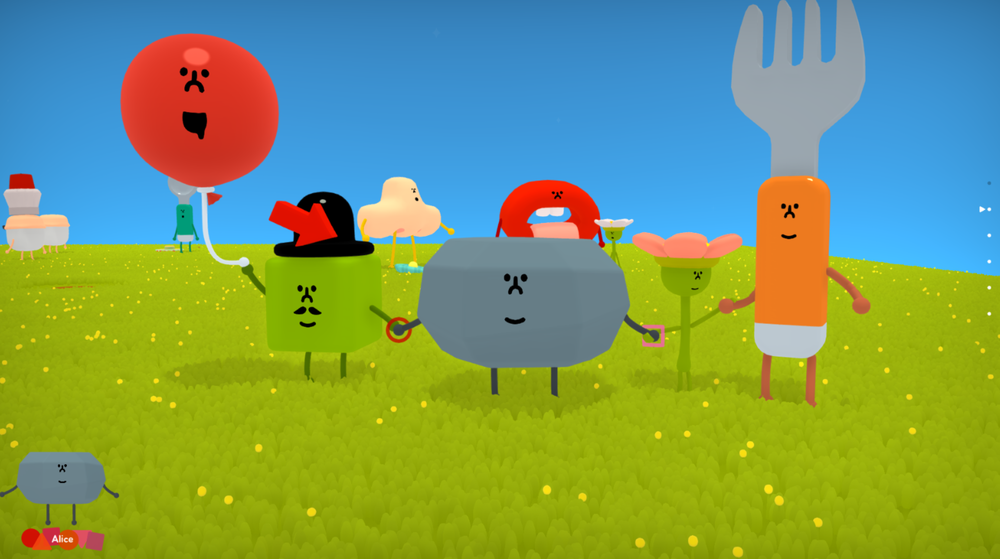
Robin Hunicke and Martin Middleton co-founded Funomena just over six years ago, after the duo worked together on the indie hit Journey at Thatgamecompany. When they came together to launch the studio, it was clear that they both shared the idea of making games that could have a positive impact on people. And so with that in mind, they put pen to paper and jotted down a core mission statement, which Funomena recently shared on its blog for the first time.
Funomena is wrapping up Wattam and is deep into Magic Leap development (which you can read more about in Part 1 of our interview), but Hunicke was happy to chat with GameDaily about her studio’s original mission statement and how the approach has evolved.
In introducing the mission statement on the blog, after the layoffs unfolded at Telltale, Hunicke remarked, “To lead under such uncertainty, you have to accept that running a game studio often means teetering on the edge of a cliff. Nothing is guaranteed.” It’s a sad reality that so many studios have to face constant uncertainty, but should developers really accept “teetering on the edge” as normal?

“We wrote [the mission statement] from a place of really open-hearted and tender feelings towards the industry,” Hunicke noted. “We had just finished making Journey, which was successful, and really feeling like, ‘Okay, this is the time.’ As we’ve run the business, I think we’ve learned that no matter where you look in the industry, when you look behind the curtain at the way that the sausage gets made, the fundamental truth is that there are very few people that are well capitalized, and then the rest of us are trying to access that capital and use it to make interesting, cool games. If Funomena had made Fortnite or Minecraft, that blog post would be very different, right?
“We’re an average, everyday indie games studio. That means that we are at the mercy of the market, and also we have to be really savvy, I think. And we have to be very gentle in terms of who we partner with and how we see that much partnership, because it’s so often the case that partners will lose interest if there isn’t a massive profit associated with the endeavor. We are currently 100% owned by Martin and myself, so we make the decisions about how the business is run. We make the decisions about who we partner with, and we are very honest with our partners about the fact that we’re trying to innovate and make new things for new platforms. Sometimes that’s not the most profitable business, but it can be very educational for both the partner and for us.”
Hunicke acknowledges that sometimes it’s “so tempting to just find the things that appeal to the known marketplace,” because trying to innovate is inherently very risky. Many developers have espoused the idea of unionization, so that they don’t get churned out like cogs at big studios and can actually feel like they have the ability to innovate without fear of losing their livelihoods. And while unions may help, the problem ultimately still comes back to capital, Hunicke stressed.
“Everyone that is working in the games industry is passionate about making games, to the point that yeah, sometimes they make decisions that aren’t the best,” she said. “[They might] stay at a job when the signs are all there that it’s not going to work out well, or you know, just keep trying and trying and trying and then not be able to get over the hump, and then suddenly have to layoff a bunch of people because you thought you could pull it out and then you couldn’t. I have a lot of empathy for both sides of that equation.
“I think the fundamental problem is still capital. You can unionize the staff of a game company, but if the way that the game company is funded is through partnership deals with publishers and investment funds, then the people that are in control of the business are the people that are in control of that capital.
“It’s very, very important. If you look at some place like Amsterdam, if you look at the Dutch solution to some of these problems, the way that it works is if you’re in business over there, and you’re employing people, there are certain laws about how people are hired and fired. Those laws determine the way that salaries are set and they determine the way that people right size their team. Those kinds of changes are much larger than just staff getting together. They’re larger than the collective bargaining that can be possible from individuals. They go all the way up to the top.”
She continued, “And it’s very important if you care about these things to think about how those kinds of changes can get put in place for all laborers. I’m also a professor at UC Santa Cruz, and the majority of the workforce on the campus is unionized, including the graduate students, and I always support them in trying to give them the best work environment and discuss hours. I’m trying to work with them to really succeed… but I think in the United States, the way that labor works is very different than in other places where this problem has been more directly addressed.”
Addressing the issue of capital is not easy. If Hunicke were starting all over now and launching a new studio, she said she might actually be willing to sell a small minority to get much needed capital.
“A friend of mine who’s running a studio as well [was just asking me this], saying if you were going to give someone advice now, what would you say? I think that my feeling right now is that if you can get someone to give you a little bit of money for a small amount of your company, if you can take a little tiny investment for a minority share, [then] that’s a really good way to bootstrap a business in this particular market,” Hunicke noted.
“There are investments out there, there are people out there (Tencent, Netease), a lot of companies right now that are cash flush that are looking to make smaller investments in studios just to kind of help seed the diversity of the landscape. I think that if you could get some of that money to start off with and run low and slow with a good idea, that would be a smart thing to do.
“But at the time that Martin and I were starting the company, the investment scene was very different, especially in San Francisco. A lot of the people that were interested in making investments were not game focused. They were coming from other places and they saw games as a way of making money. They weren’t really interested in the ecosystem of the business itself, and I think that’s changed, which is great.”
The good news now is, even if finding capital is a challenge, that the industry has matured and continues to do so. More and more entrepreneurs understand the importance and value of games as a medium.
“I think there are people now who have been in the industry long enough that made enough money, that they’re starting to put some of the money they’ve made back into the ecosystem and create a sense of situation where the rising tide floats all boats, and I think that’s actually really fantastic,” Hunicke added. “So I think people that are starting now have the opportunity to get a little bit of funding without having to sacrifice too much, which is exciting. It is a different way of doing things than what we did, which was to just bootstrap partner deals and try and do the best work we can on every project. But I think it is a positive outcome of a lot of these more recent moves.”
In Funomena’s mission statement, the studio mentions sustainability and supporting families, which of course remains a vital goal today as the crunch discussion continues. The company also states that, “People are not connected/present to themselves or the joy of life around them. Often, the entertainment we create exacerbates this problem instead of helping fix it. We would like to change that.” Hunicke could never have envisioned the sort of toxic political climate we’re all living in now when she started Funomena, but if anything the goal of connecting people to the joy of life around them and injecting some positivity has never been more important.

“We’ve actually iterated a lot on trying to think about, ‘Okay, this core that we wrote down six years ago, how does it translate into building a successful profitable business? How does it translate into scaling appropriately as we grow?’ When we started, we were just two of us working in my living room, but now we’re 28 people,” she said. “There [are] a lot of processes that go on as you develop a company, but at a very base level, I do what I do everyday at Funomena because I love the people that I work with. I really appreciate and cherish the people that have come to work with us, their creativity, their style, their individual ways of being.
“We have people from all over the world working with us, all walks of life, all kinds of experiences, all ways of expressing themselves. And if Funomena could be 1000 people, or 10,000 people, I would want to feel that same way. I would want to feel like everyone that worked with us was on the same path, trying to take away some of the stress and the pain and the suffering that people go through every day.
“If you look at angry tweets or you look at… commentary that led to the Black Lives Matter movement, the commentary that you see on communities about inclusion and different things. You look at the really toxic stuff, and behind each one of those statements is a very unhappy person. If you really think about it…they come from people that feel out of control, unhappy, loss of ownership, loss of power, etc. And the best way to make the world a better place is to make sure that you’re not one of those people. If there’s on thing that I can do at Funomena, I hope, it’s to increase the chances that when people come to work, it doesn’t make them one of those people.”
To that end, Hunicke sees interactive entertainment as a force for good. If her studio can produce games that make people feel happy and more connected to their neighbors, then maybe, just maybe she can help erase a little toxicity from the world.
“It’s an interesting time to be a human and think about being part of a community and how your actions and your attitude reinforce positive or negative feelings,” she remarked. “I think as creatives, you have the opportunity to build things that reinforce the positive and also teach a message of, “Let it go,’ and sort of giving up control so that they train us to collaborate. A lot of games have really strong hero narratives, where you’re the only person that can save the world, and everyone’s looking to you to get it done. And you solved the challenges, and yay, you win. That’s not really how life is.
“If we’re going to fix the planet and coexist peacefully without nuking each other, if we’re going to accept the fact that this is a relatively small place in a scale of geologic time and universal space, then we need to get different skills. So I’m really interested in games and experiences that emphasize friendship and collaboration, working together to build and grow, and hold hands and get to the future. I think it probably sounds pretty Pollyanna when you type that out, but I really do believe that we have the ability to increase the peace.”
While Hunicke is a veteran of game design, having worked at Looking Glass and Electronic Arts in her earlier years, it wasn’t until founding Funomena that she had to learn more of the business side. This is something that a lot of indies struggle with, but she advises them not to be afraid of learning.
“The very first lesson that I learned actually was told to me by everyone else who’d ever started a business that was a designer,” she explained. “I went to a conference with a bunch of fellow designers, narrative designers, and I started a discussion that was basically, ‘How do I not screw up?’ The very first thing that everyone said to me in that roundtable environment was, ‘Get ready to do a lot less of the things that you’re already good at.’ I had this idea that I’d start the business and then I’d be in the level making stuff, doing all these things. And what ends up happening is, is you bootstrap…
“You are doing a lot, and then as the business grows and as it becomes more successful and as you get more work, you do less and less of the things you’re good at, and more and more of these things that you have no idea how to do. That could be negotiating a contract. It could be talking to someone about taking a strategic investment in your company. It could be distributing shares. It could be dealing with significant HR issues inside of your organization or a contractor who doesn’t do their work. Or someone who doesn’t pay you. There are all these things that come with running a business that nobody really talks about because they’re mostly unpleasant, and you end up doing a lot of them.
“So I think that the advice my friends were trying to give me was just be okay at not being perfect at the things you have to do, and just give yourself time to learn. But I think what I heard was, ‘Oh, get ready to do all the sucky jobs.’ It really took awhile for it to settle in that actually what they were saying was, ‘You know, this is just a part of the service that you do as a founder, or as an owner, or as a CEO. You have to do this work.’ … It’s also okay that you’re not super at it at first, because everybody needs to learn somehow. The only way you learn is by doing it.”
So what’s next for Hunicke and Funomena, aside from more Magic Leap collaboration? She’s hoping to leverage her background in artificial intelligence (she’s ABD on a PhD in AI) and systems-based design (she was heavily influenced by legends like Will Wright and Warren Spector) to make games that are truly immersive.
“The next title that I’m working on has a huge amount of AI in it, and it’s kind of the culmination of all of the things I wanted to get into Journey that we couldn’t get into Journey,” she commented. “So a lot of the other ideas that I’ve had over the years about how to make experiences that are really tailored to player needs, and I just think the most important thing that you can do with AI is listen. A lot of games do not pay attention to what their players are doing. It’s like they’re on a date and they’re looking at their phone. A lot of games are just like, ‘Yeah no, press the button.’ And they just are waiting for you to finish the target thing that you need to do, then they’re just literally pulling for one feature or one specific data point, and the rest of the stuff that you do is just invisible for them.
“Games can be so much more responsive. They can pay so much more attention to you. They can listen to what you’re doing and they can respond to you. The only reason we don’t do it is because we spend most of our time worrying about rendering the buttons on a jacket of a guy that you shoot from 30 feet away. There’s so much detail in a lot of the games that we make now. They’re so high fidelity, and yet they could be so dynamic. They could be so systems-based.”
 GameDaily.biz © 2026 | All Rights Reserved.
GameDaily.biz © 2026 | All Rights Reserved.